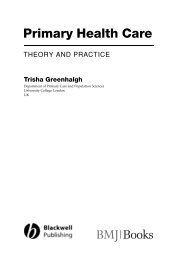DOING BUSINESS 2009 - JOHN J. HADDAD, Ph.D.
DOING BUSINESS 2009 - JOHN J. HADDAD, Ph.D.
DOING BUSINESS 2009 - JOHN J. HADDAD, Ph.D.
You also want an ePaper? Increase the reach of your titles
YUMPU automatically turns print PDFs into web optimized ePapers that Google loves.
South Asia(8 economies) 6Note: A rSource: DOverviewStarting abusinessDealing with construction permitsEmploying workersRegistering propertyGetting creditProtecting investorsPaying taxesTrading across bordersEnforcing contractsClosing a businessNote: A reform is counted as 1 reform per reforming economy per year.Source: Doing Business database.FIGURE 2.1Top 10 reformers in starting a businessAverage improvement200746% 65% 54% 28% 1.2.3.4.YemenSloveniaSenegalAlbania20085.6.7.8.9.10.LiberiaAzerbaijanSyriaHungaryOmanSierra LeoneProcedures Time Cost Paid-inminimumcapitalSource: Doing Business database.STARTING A <strong>BUSINESS</strong> 9FIGUREStartingets faTime and2004Time (d1220Cost(% of inc14.4Julian started out working for her brothers.But she was saving to start her ownbusiness. She began trading, travelingfrom Uganda to neighboring Kenya tobuy goods for resale. “I would take theovernight bus and stand up the wholeway to get the 50% discount,” she recalls.“My aim was to start a juice processingbusiness, a real factory.”Once she had saved enough money,Julian began production. Unable to affordtransport, she had to take her productsby foot to the government chemistfor testing. “My only means of transportwas my wheelbarrow, and I was thewhole company.”Julian also remembers how arduousit was to register her business. “Therewas so much to do and so many differentplaces I had to go—for businessregistration and taxpayer identificationFIGURE Table 2.6 2.1One-stop Where is it shops—same easy to start name, a business—anddifferent resultsTime where and procedures not? to start a businessnumbers, different licenses from differentauthorities, a declaration that had tobe made before a commissioner of oaths,a company seal to get, inspections ofmy premises from municipal and healthauthorities. I remember paying a lawyerwhat seemed to me a gigantic fee ofUSh 500,000 [$279].” 1Entrepreneurs like Julian now haveit easier. Reforms in Uganda and in manyother economies have streamlined businessstart-up in the past 5 years. Look atAzerbaijan. In 2004 its government set apreliminary time limit for the registrationprocess. In 2005 it introduced asilence-is-consent rule for tax registration.A year later it further tightened thetime limit for business registration. In2007 it abolished the need for a companyseal. And in 2007/08 it set up a one-stopshop. Starting a business used to take 122days. Now it takes only 16 (figure 2.3).Formal incorporation of companieshas several benefits. Legal entities outlivetheir founders. Resources are oftenOne-stop shoppooled as shareholders join forces tostart a company. And companies have accessto services and institutions rangingfrom courts to commercial banks.But many Required economies make startingadditionaland legally running procedures a business as measuredby Doing Business so cumbersomethat entrepreneurs opt out and operate inthe informal sector.Simpler entry encourages the creationof new companies. Take Senegal,which reformed business registration inEasiestParaguayRank Most difficult RankNew Zealand 1 Cameroon 172Belarus Canada 2 Djibouti 173Australia 3 Equatorial Guinea 174Burkina FasoGeorgia 4 Iraq 175Morocco Ireland 5 Haiti 176United States 6 Guinea 177Turkey Mauritius 7 Eritrea 178United Kingdom 0 8 Togo 10 17920 30Puerto Rico 9 Chad Time to 180 start a business (days)Source: Doing Business database.Singapore 10 Guinea-Bissau 181FIGURE Note: Rankings 2.4 are the average of the economy rankings on theprocedures, time, cost and paid-in minimum capital for starting aEasternbusiness. SeeEuropeData notes for&details.Central Asia leads reforms, Africa runner-upSource: Doing Business database. Number of reforms easing business start-upby Doing Business report yearDB2005 DB2006 DB2007 DB2008 DB<strong>2009</strong>Eastern Europe& Central AsiaJuly 2007. By May 2008 entrepreneurs hadregistered 3,060 new firms, 80% more thanin the previous year. Studies in Mexico,India, Brazil and the Russian Federationall conclude that simpler entry regimesare associated with more new firms beingregistered. The study in Mexico analyzesthe effect of making it simpler to get amunicipal license, 1 of several proceduresrequired to start a business. The finding:easing business entry increased new startupsby about 4%. 2Easier start-up is also correlatedwith higher productivity among existingfirms. A recent study, in an analysis of 97countries, finds that reducing entry costsby 80% of income per capita increasestotal factor productivity by an estimated22%. Analyzing 157 countries, it findsthat the same reduction in entry costsraises output per worker by an estimatedFIGURE 2.2Rankings on starting a businessare based on 4 subindicatorsPreregistration,registration andpostregistrationProcedure iscompleted whenfinal documentis receivedFIGURE 2.5Top 5 reform featuresin starting a business(c) The International Bank for Reconstruction and Development 52 / The World BankAs % of income percapita, no bribes included25% 25%Time Cost25%ProceduresNote: See Data notes for details.25%Paid-inminimumcapitalFunds deposited in a bankor with a notary beforeregistration0Source: D
















